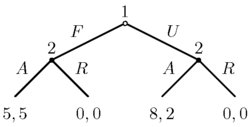 Game theory and behavioral economics is scientific enough to bring this to the Dodger's blog.
Game theory and behavioral economics is scientific enough to bring this to the Dodger's blog.The ultimatum game should caution an employer in a dominant position, like Delphi is these days. It should caution an occupying power, like the US in Iraq.
Basically, the dominant player offers a division of the reward to the second player in a single transaction game. In the case above, the first player offers 2 to the second, keeping 8. If the second player refuses, both get nothing. From the second player's perspective, even a penny is better than nothing. However, when the game is played in the laboratory, the second player rejects low offers frequently, and the first player offers substantial amounts, like 3 to 5 points.
Game theorists speculate why. The Dodger thinks it's because people react like it's a multiple interaction game rather than a single transaction, because that's life. In real life you can never be sure you will never see the other guy again, or that he won't see you and screw you again.
Let's take the situation with Delphi. Say Delphi offers to pay $1.00 over market wage. If the workers reject, their alternative is to go out on strike and maybe kill the company, in which case they go out and get a market wage job, and give up the dollar. Which they may well do, if the offer is too much of an ultimatum.
The important calculation is how much worse off will the Delphi executives who are making abusive offers be if they blow up Delphi and sink GM. If they aren't any worse off, why should they care?
>>>>>>>>>>>>>>>>>>>>
http://en.wikipedia.org/wiki/Ultimatum_game
Ultimatum game
From Wikipedia, the free encyclopedia.
The Ultimatum game is an experimental economics game in which two parties interact anonymously and only once, so reciprocation is not an issue. The first player proposes how to divide a sum of money with the second party. If the second player rejects this division, neither gets anything. If the second accepts, the first gets their demand and the second gets the rest.

No comments:
Post a Comment